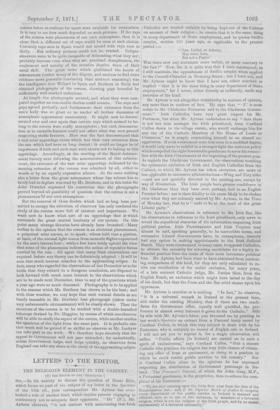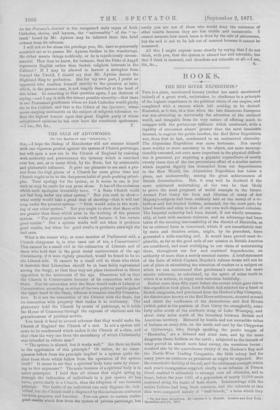LETTERS TO THE EDITOR.
THE RELIGIOUS ELEMENT IN THE CABINET.
[To THE ]DITOIL or l'EL16 "S1'ECITATOR."3 Srit,—In his anxiety to discuss the question of Horne Rule, which forms no part of the subject of tuy letter in the Spectator of the 1911 ult., your correspondent Mr. Ay toun has over- looked a rule of another kind, which enjoins persons engaging in
controversy not to misquote their opponents. lie" (F.), Mr. Aytoun observes, "is not content with maintaining that Irish Catholics aro treated unfairly by being kept' out of the Cabinet on account of their religion o he asserts that it is the same thing in every department of State employment, and lie quotes Swift's couplet, written 150 years ago, as applicable to the present period ; "'Jew, Inadel, or Atheist, May enter hero, But not a Papist.'
Was there ever any statement more unfair, or more contrary to the fact ?" Now Sir, it is quite true that I have maintained, as I still maintain, the appositeness of Swift's couplet when applied to the Couneil-Chamber ,in Downing Street ; but I have net, and Mr. Aytouu ought to know that I have not, either asserted or implied "that it is the same thing in every department of State einployinent," for I never, either directly or indirectly, made any aSSertion of the kind.
' Mr: Aytoun is not altogether trustworthy in matters of opinion, any more than in matters of fact. lie says that "4F.' is most unfair to Mr. Chichester Fortescue and to the Gladstone Govern- ment." Catholics ' have .very great respect for Mr. Forteseue, but When Mr. Aytoun undertakes to say "that there is not one man amongst time Irish priesthood, from Cardinal Cullom down to the village curate, who would exchange him for any one of the Catholic Members of the : House of Lords or Commons," he is simply committing himself to an absurd ex- aggeration. If such a statement were true even in a modified degree, it would only servo to exhibit in a stronger light the tortuous policy which Compelled the right honourable gentleman to sever his connec- tion with the Irish Governinent at the beginning of the present year. As regards the Gladstone Government, the observations touching the systematic exclusion of Irish and English Catholies from the Cabinet, to which Mr. Ayt01.11.1 hiss taken exception, are more or less applicable to successive administrations—Whig and Tory alike —and: are not specially directed to the existing one, except by way Of illustration. The Irish people have greater confidence in Mr. Gladstone than they have ever, perhaps, had in. an English Premier before ; nor is their fidelity to his cause likely to be shaken even when they are solemnly sissured by Mr. Ay tour), in the Times
of Monday last, that he is "unfit to be at the head of the great Liberal party."
Mr. Aytoun'e observations in reference to the Irish Bar, like his observations in reference to the Irish priesthood, only serve to reveal the superficial character of his information respecting Irish political parties. Irish Protestantism and Irish Toryism may
almost be said, speaking 'generally, to be convertible terms, and successive Liberal Governments have, in consequence, scarcely had any : option in making appointments to the Irish judicial Bench: They were constrained, in Many cases, to appoint Catholics, to obviate the necessity for selecting candidates for a highly in- fluential position from the ranks of their most inveterate political
foes. •Mr. Aytoun had been wiser to have abstained from institut- ing comparisons of this kind, for they are only calculated to re- vive our recollection of the unfair exclusion, for many years, of a late eminent Catholic judge, Mr. Justice Shoe, from the English Bench, an exclusion which might have lasted to the day of his death, but that the Press and the Bar cried shame upon his oppressors.
Mr. Aytoun is oracular or is nothing. "In fact," he observes, "it is a universal remark in Ireland at the present time, and :under the existing Ministry, that if there are two candi- dates for Government Office, equally well qualified, the pre- ference in almost every instance is given to the Catholic." Side by side with Mr. Aitoun's letter, you favoured me by printing in last week's Spectator an extract from a Pastoral lately issued by Cardinal Cullen, in Which this very subject is dealt with by his Eminence, who is certainly no enemy of English rule in Ireland.
I will not ask' you to reprint it, for a single observation will suffice, " Public affairs [in Ireland1 are carried on in such a
spirit of exclusiveness," says Cardinal Cullen, "that a sincere Catholic who practises his religion has very little chance of obtain- ing any 'office of trust or emolument, or rising to a position in which he could render public services to his country." Nor is Cardinal Cullen alone in the opinions he has expressed respecting the distribution of Government patronage in Ire- land. The Freeman's Journal, of which Sir John Gray, M.P., a Protestant gentleman, is the proprietor, thus re-echoes the com- plaint of his Eminence ;— "We aro now entering upon the forty-first year from the date of the Emancipation Act ; and, if /lir k'7‘,'sperun. Beach gl Justice be excepted, every department of the public service in Ireland is manned and ollicored, save as to one or two instances, by members of a favoured religion, which is not the religion of the Irish people, and.by no means ; uncommonly of a favoured nationality." As the Freeman's Journal is the recognized daily organ of Irish Catholics, clerics, and laymen, the " universality " of the " re- mark' heard by Mr. Aytoun may be inferred from this brief extract from its columns.
I will not so far abuse the privilege you, Sir, have so generously accorded me as to pursue Mr. Aytoun further in his wanderings. He either asserts things recklessly, or he is injudiciously circum- stantial. How does he know, for instance, that the Duke of Argyll represents English rather than Scotch religious interests in the Cabinet ? If I may be allowed to borrow a metaphor from beyond the Tweed, I should say that Mr. Aytoun dances the Highland fliog to perfection. But for my own part, I prefer an opponent who confines himself strictly to the question at issue, which, in the present case, is not inaptly described at the head of this letter. In reverting to that question again, I am desirous of saying—and I say it with the utmost possible sincerity—that there is one Protestant gentleman whom we Irish Catholics would gladly see in the Cabinet, and that is the Editor of the Spectator, whose never-varying sentiments on the subject of religious toleration re- flect the highest honour upon that great English party of whose enlightened opinions he has ever been the consistent spokesman.































 Previous page
Previous page